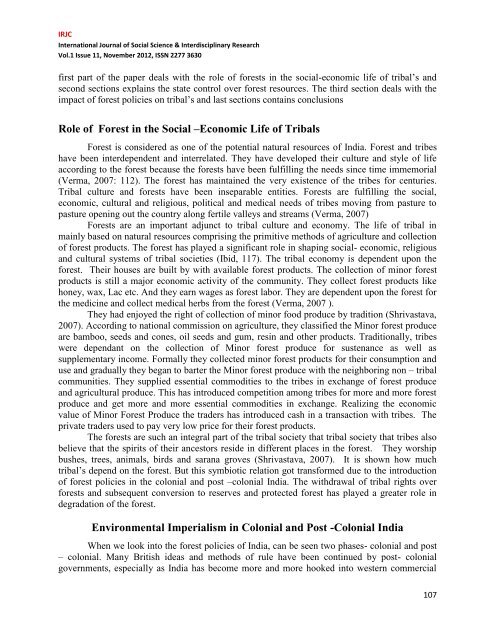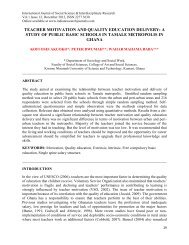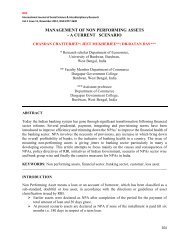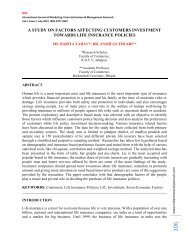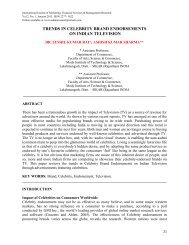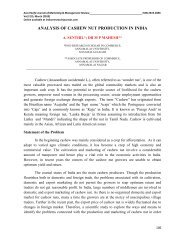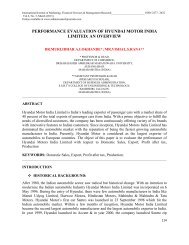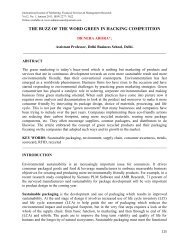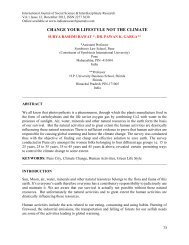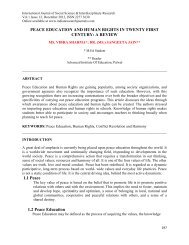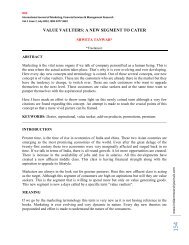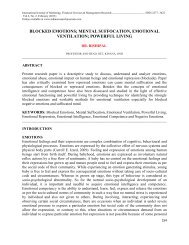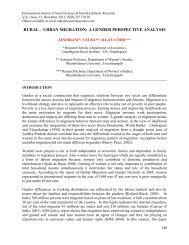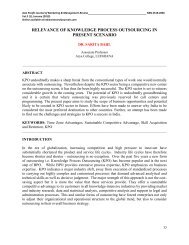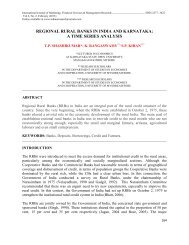historical injustice toward tribals: a reflection on forest policies of india
historical injustice toward tribals: a reflection on forest policies of india
historical injustice toward tribals: a reflection on forest policies of india
Create successful ePaper yourself
Turn your PDF publications into a flip-book with our unique Google optimized e-Paper software.
IRJC<br />
Internati<strong>on</strong>al Journal <strong>of</strong> Social Science & Interdisciplinary Research<br />
Vol.1 Issue 11, November 2012, ISSN 2277 3630<br />
first part <strong>of</strong> the paper deals with the role <strong>of</strong> <strong>forest</strong>s in the social-ec<strong>on</strong>omic life <strong>of</strong> tribal‟s and<br />
sec<strong>on</strong>d secti<strong>on</strong>s explains the state c<strong>on</strong>trol over <strong>forest</strong> resources. The third secti<strong>on</strong> deals with the<br />
impact <strong>of</strong> <strong>forest</strong> <strong>policies</strong> <strong>on</strong> tribal‟s and last secti<strong>on</strong>s c<strong>on</strong>tains c<strong>on</strong>clusi<strong>on</strong>s<br />
Role <strong>of</strong> Forest in the Social –Ec<strong>on</strong>omic Life <strong>of</strong> Tribals<br />
Forest is c<strong>on</strong>sidered as <strong>on</strong>e <strong>of</strong> the potential natural resources <strong>of</strong> India. Forest and tribes<br />
have been interdependent and interrelated. They have developed their culture and style <strong>of</strong> life<br />
according to the <strong>forest</strong> because the <strong>forest</strong>s have been fulfilling the needs since time immemorial<br />
(Verma, 2007: 112). The <strong>forest</strong> has maintained the very existence <strong>of</strong> the tribes for centuries.<br />
Tribal culture and <strong>forest</strong>s have been inseparable entities. Forests are fulfilling the social,<br />
ec<strong>on</strong>omic, cultural and religious, political and medical needs <strong>of</strong> tribes moving from pasture to<br />
pasture opening out the country al<strong>on</strong>g fertile valleys and streams (Verma, 2007)<br />
Forests are an important adjunct to tribal culture and ec<strong>on</strong>omy. The life <strong>of</strong> tribal in<br />
mainly based <strong>on</strong> natural resources comprising the primitive methods <strong>of</strong> agriculture and collecti<strong>on</strong><br />
<strong>of</strong> <strong>forest</strong> products. The <strong>forest</strong> has played a significant role in shaping social- ec<strong>on</strong>omic, religious<br />
and cultural systems <strong>of</strong> tribal societies (Ibid, 117). The tribal ec<strong>on</strong>omy is dependent up<strong>on</strong> the<br />
<strong>forest</strong>. Their houses are built by with available <strong>forest</strong> products. The collecti<strong>on</strong> <strong>of</strong> minor <strong>forest</strong><br />
products is still a major ec<strong>on</strong>omic activity <strong>of</strong> the community. They collect <strong>forest</strong> products like<br />
h<strong>on</strong>ey, wax, Lac etc. And they earn wages as <strong>forest</strong> labor. They are dependent up<strong>on</strong> the <strong>forest</strong> for<br />
the medicine and collect medical herbs from the <strong>forest</strong> (Verma, 2007 ).<br />
They had enjoyed the right <strong>of</strong> collecti<strong>on</strong> <strong>of</strong> minor food produce by traditi<strong>on</strong> (Shrivastava,<br />
2007). According to nati<strong>on</strong>al commissi<strong>on</strong> <strong>on</strong> agriculture, they classified the Minor <strong>forest</strong> produce<br />
are bamboo, seeds and c<strong>on</strong>es, oil seeds and gum, resin and other products. Traditi<strong>on</strong>ally, tribes<br />
were dependant <strong>on</strong> the collecti<strong>on</strong> <strong>of</strong> Minor <strong>forest</strong> produce for sustenance as well as<br />
supplementary income. Formally they collected minor <strong>forest</strong> products for their c<strong>on</strong>sumpti<strong>on</strong> and<br />
use and gradually they began to barter the Minor <strong>forest</strong> produce with the neighboring n<strong>on</strong> – tribal<br />
communities. They supplied essential commodities to the tribes in exchange <strong>of</strong> <strong>forest</strong> produce<br />
and agricultural produce. This has introduced competiti<strong>on</strong> am<strong>on</strong>g tribes for more and more <strong>forest</strong><br />
produce and get more and more essential commodities in exchange. Realizing the ec<strong>on</strong>omic<br />
value <strong>of</strong> Minor Forest Produce the traders has introduced cash in a transacti<strong>on</strong> with tribes. The<br />
private traders used to pay very low price for their <strong>forest</strong> products.<br />
The <strong>forest</strong>s are such an integral part <strong>of</strong> the tribal society that tribal society that tribes also<br />
believe that the spirits <strong>of</strong> their ancestors reside in different places in the <strong>forest</strong>. They worship<br />
bushes, trees, animals, birds and sarana groves (Shrivastava, 2007). It is shown how much<br />
tribal‟s depend <strong>on</strong> the <strong>forest</strong>. But this symbiotic relati<strong>on</strong> got transformed due to the introducti<strong>on</strong><br />
<strong>of</strong> <strong>forest</strong> <strong>policies</strong> in the col<strong>on</strong>ial and post –col<strong>on</strong>ial India. The withdrawal <strong>of</strong> tribal rights over<br />
<strong>forest</strong>s and subsequent c<strong>on</strong>versi<strong>on</strong> to reserves and protected <strong>forest</strong> has played a greater role in<br />
degradati<strong>on</strong> <strong>of</strong> the <strong>forest</strong>.<br />
Envir<strong>on</strong>mental Imperialism in Col<strong>on</strong>ial and Post -Col<strong>on</strong>ial India<br />
When we look into the <strong>forest</strong> <strong>policies</strong> <strong>of</strong> India, can be seen two phases- col<strong>on</strong>ial and post<br />
– col<strong>on</strong>ial. Many British ideas and methods <strong>of</strong> rule have been c<strong>on</strong>tinued by post- col<strong>on</strong>ial<br />
governments, especially as India has become more and more hooked into western commercial<br />
107


